
Proton Drive Review 2025: A Cloud Storage That Respects Your Privacy?
Want to store your documents conveniently in the cloud without losing control of your data? Take a look at Proton Drive: This privacy-focused cloud storage positions itself as a privacy-friendly alternative to Google Drive, Microsoft OneDrive, and similar services. But how good is Proton Drive really?
We thoroughly tested Proton Drive to find out if this cloud storage is as secure as promised – and what else it can do.
Proton Drive* is a cloud storage service from the Swiss company Proton AG . Based in Plan-les-Ouates near Geneva, this tech company specializes in online privacy protection solutions, including a VPN and a password manager.
Many Proton solutions position themselves as secure and private alternatives to popular online services that might raise privacy concerns. For example, Proton Mail is an encrypted email service for sensitive emails, while Proton Calendar is an encrypted calendar service.
Proton Drive follows this same approach. Unlike cloud giants like Google and Microsoft, it uses end-to-end encryption. "Unlike Big Tech, Proton can't access your files," the company promises.
But does Proton Drive offer more than just good security standards? Read our review to find out.
Proton Drive Review
High security standards with E2E encryption
Proton Drive stands out with its privacy protection, offering standard end-to-end encryption and open-source apps.User-friendly interface
The web, desktop, and mobile apps have a clean design that makes storing and syncing files across devices simple.Good bundle pricing
If you want to use other Proton products like Proton VPN, Proton Mail, and Proton Pass, you can save money with their bundle deals.
Poor performance
Proton Drive disappointed in our speed tests with slow upload and download speeds. Other cloud storage services sync much faster.Limited features
Proton Drive's features are basic, and the available ones often lack flexibility. For example, it's missing advanced sharing options and reliable file preview.Not a complete collaboration solution
Despite having a document editor, the collaboration features are basic and can't compete with Google, Microsoft, or Dropbox.
User Interface and Ease of Use
| Platforms | Windows 7/8 not supported. | 3/4 |
| Web Interface |
| 2/4 |
| Desktop App |
| 2/4 |
| Mobile App |
| 1.5/3 |
Despite its privacy focus, Proton Drive works just like any other cloud storage service. You can upload your files to the cloud and access them through dedicated interfaces in your browser, on your desktop, or through a smartphone app.
It works well overall, though it offers fewer features compared to the big cloud storage providers.
Let's take a closer look at Proton Drive's three interfaces:
Firefox, Brave, Tor Browser, Chrome, Safari, Edge, Opera and others
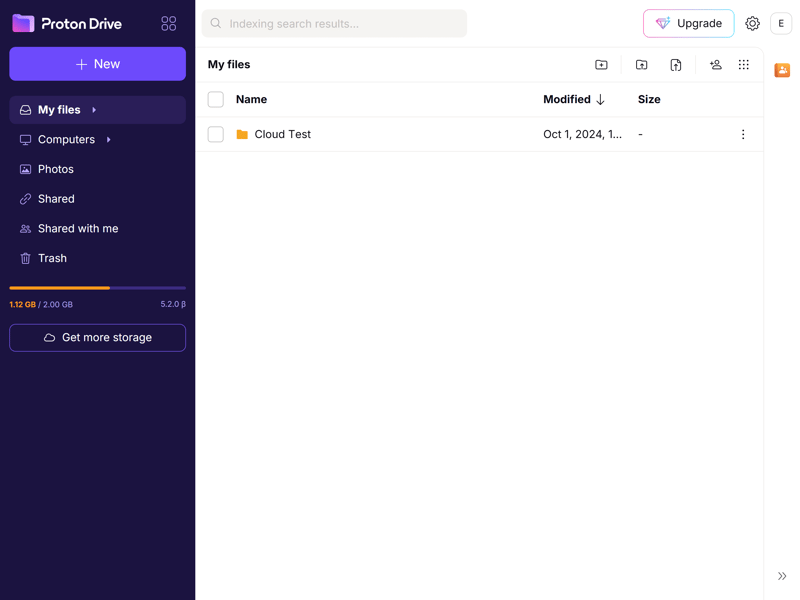
Proton Drive's web interface.
You can manage your cloud storage content directly in your browser using the web interface. While it supports all common browsers, Proton mainly recommends those focused on privacy – especially Firefox, Brave, and Tor Browser.
The web interface has a user-friendly layout. The main menu on the left leads to all key features: The "New" button in the top left lets you quickly upload files and create folders.
In "My Files," you'll find all your cloud folders; the "Computer" menu gives you access to local folders on your devices that you've enabled for syncing. There are also sections for photos, shared files, and a trash bin.
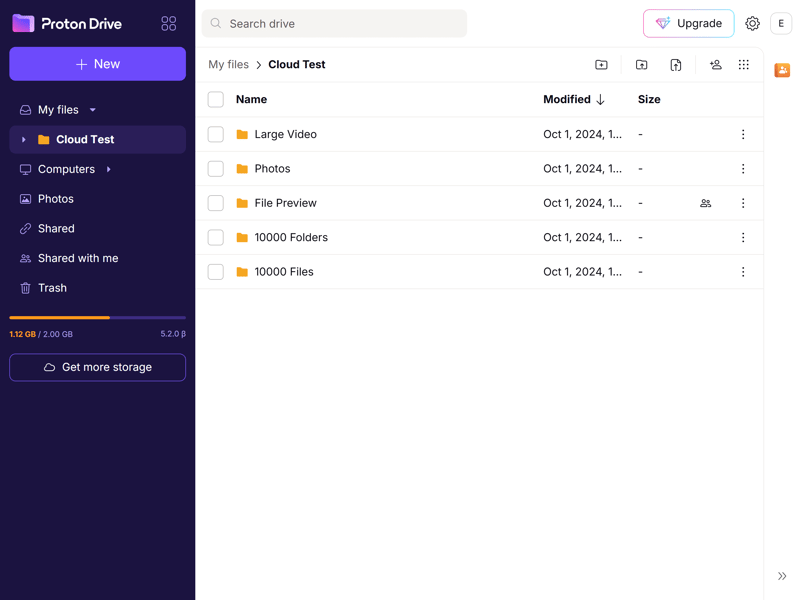
The browser interface has a user-friendly design.
Proton Drive now includes its own document editor that lets you edit documents directly in the cloud and work with team members (more on this later).
However, Proton isn't nearly as flexible as Google, Microsoft, or Dropbox: You can only open and edit text documents - and only those created (or converted) with the editor. You need to download all other file types before you can edit them.
Unfortunately, Proton doesn't automatically convert text files, except for .docx files. For example, if you want to edit a .doc file in the document editor, you first need to download it, save it as a .docx file, and upload it again - only then can you preview and convert the document for editing. Pretty inconvenient.
Most files - even common types like PDFs or Docs - don't even show a preview. You can only play videos smaller than 100 MB.
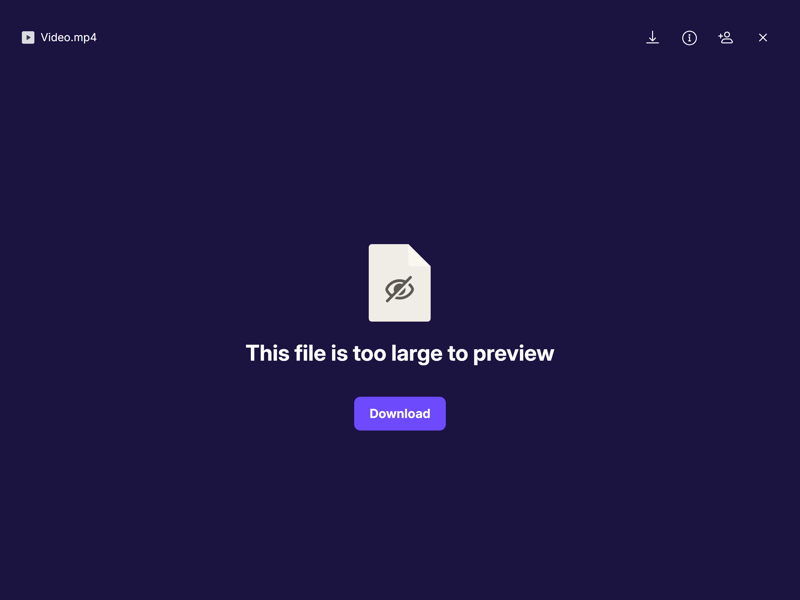
The media player has limited use due to the 100 MB file limit.
Proton Drive is still far from competing with the comprehensive collaboration platforms of major cloud providers: Despite taking first steps in this direction, the web platform remains primarily focused on organizing files in the cloud, not viewing and editing them.
Windows, Mac
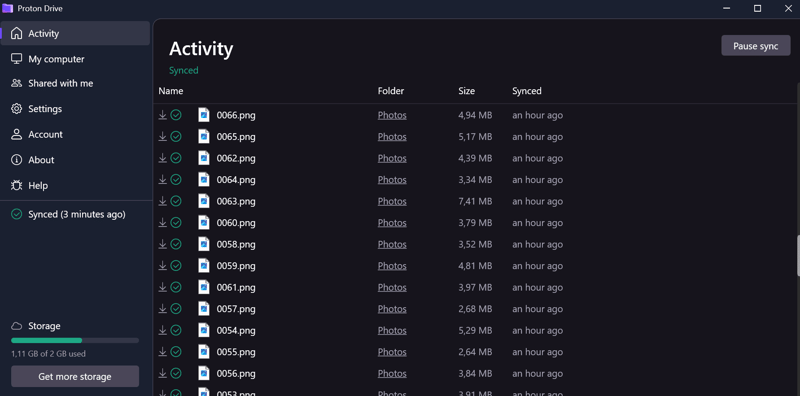
The Proton Drive desktop app is currently only available in English.
The Proton Drive desktop app works on Windows and macOS, with the Windows version offering slightly more features. Unfortunately, Proton doesn't provide a Linux client.
The app works as a sync assistant to keep your cloud files available across devices. When installing the desktop app, you set up a sync folder on your device. This lets you access your cloud files directly through your file manager and handle them like local files - moving, editing, and deleting them.
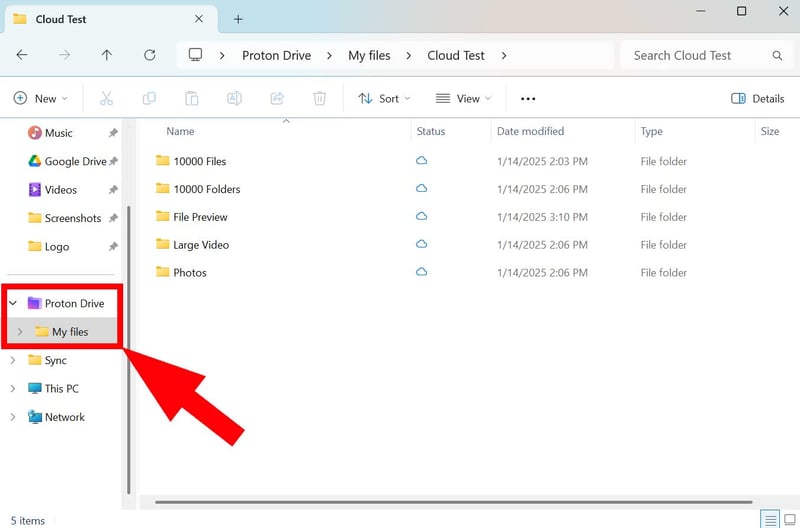
You can manage your cloud files directly in the file manager.
On Windows, you can also sync local folders with the cloud. To do this, open the desktop client and select the folders you want to back up to the cloud in the "My Computer" section. We'll explain the sync options in more detail in the next chapter.
Android, iOS
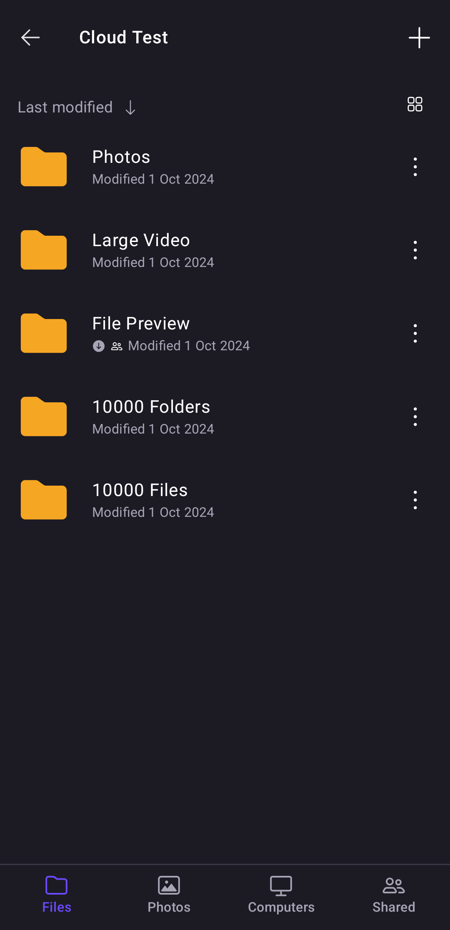
The Proton Drive mobile app.
With the Proton Drive mobile app, available for Android and iOS devices, you can access your cloud files on the go. This includes both your primary sync folder and any local folders you've manually set up for syncing.
The app includes a photo backup feature that automatically saves all photos and videos from your device to the cloud. You can choose whether to sync media over WiFi only or also using mobile data. You can also take new photos directly within the app and save them straight to cloud storage. However, there's no dedicated document scanning feature.
You can use all the basic features of the web app on your phone, including the document editor. It does unfortunately have the same limitations: preview is only available for a few documents and media files, and on mobile, you won't even see an error message or compatibility warning - the files simply won't load.
Overall, the mobile app works well, though it could offer more features.
Here's an overview of all platforms supported by Proton Drive:
| Proton | Tresorit | pCloud | MEGA | Icedrive | STRATO | IONOS | Dropbox | Sync.com | Microsoft OneDrive | Google Drive | |
|---|---|---|---|---|---|---|---|---|---|---|---|
| Desktop | |||||||||||
| Windows 7/8 | ✗ | ✓ | ✓ | ✓ | ✓ | ✓ | ✓ | ✗ | ✗ | ✗ | ✗ |
| Windows 10/11 | ✓ | ✓ | ✓ | ✓ | ✓ | ✓ | ✓ | ✓ | ✓ | ✓ | ✓ |
| macOS (Intel) | ✗ | ✓ | ✓ | ✓ | ✓ | ✓ | ✓ | ✓ | ✓ | ✓ | ✓ |
| macOS (Apple Silicon) | ✓ | ✓ | ✓ | ✓ | ✓ | ✓ | ✓ | ✓ | ✓ | ✓ | ✓ |
| Linux | ✗ | ✓ | ✓ | ✓ | ✓ | ✗ | ✗ | ✓ | ✗ | ✗ | ✗ |
| Mobile | |||||||||||
| iOS | ✓ | ✓ | ✓ | ✓ | ✓ | ✓ | ✓ | ✓ | ✓ | ✓ | ✓ |
| Android | ✓ | ✓ | ✓ | ✓ | ✓ | ✓ | ✓ | ✓ | ✓ | ✓ | ✓ |
| Total | 4 | 7 | 7 | 7 | 7 | 6 | 6 | 6 | 5 | 5 | 5 |
Proton Drive stands out with its clean, intuitive apps that let you quickly and reliably access your files in cloud storage. However, since Proton prioritizes privacy over convenience, you'll have to do without some features you might be used to from other cloud storage services. For example, viewing and editing your documents in the cloud is limited.
Storing & Syncing Files
| Synchronization | Online mode ("on-demand synchronization"), otherwise few features | 1/5 |
| Performance |
| 3/10 |
Reliable syncing is the foundation of any cloud storage: it keeps your files up to date across all your devices. Proton Drive offers two main ways to sync your data:
"Proton Drive" folder
Proton Drive creates a main cloud storage folder that automatically syncs with the cloud. Any files you put here or edit will sync across devices and are available through the web interface, on your desktop (right in the file manager), and in the mobile app. When you edit files locally, the changes automatically upload to the cloud."My Computer" feature
This option lets you link existing local folders on your device to Proton Drive without moving them to the "My Drive" folder. This keeps your folder structure intact while Proton Drive backs up and syncs the contents in the background. It's especially handy when you want to back up large projects or existing directories without changing your workflow.
On-Demand Sync: Flexible File Access
You can choose different sync settings for the files in your Proton Drive folder. The "on-demand sync" ensures that you only store files on your device that you actually need, while the rest stay in the cloud without taking up local storage space.
There are three storage categories:
- 1.
Online-only files:
By default, synced files stay "online-only." This means they show up in your computer's file manager but don't take up storage space - until you open them. The file only downloads when you access it. - 2.
Offline available files:
Once you open a file, it downloads and stays available offline, so you can use it anytime without an internet connection. You can manually set these files back to "online-only" by right-clicking and selecting "Free up space." - 3.
"Always available" files:
If you want to keep certain files or folders permanently on your device, you can right-click and mark them as "Always keep on this device." These files stay stored offline until you manually set them back to "online-only."
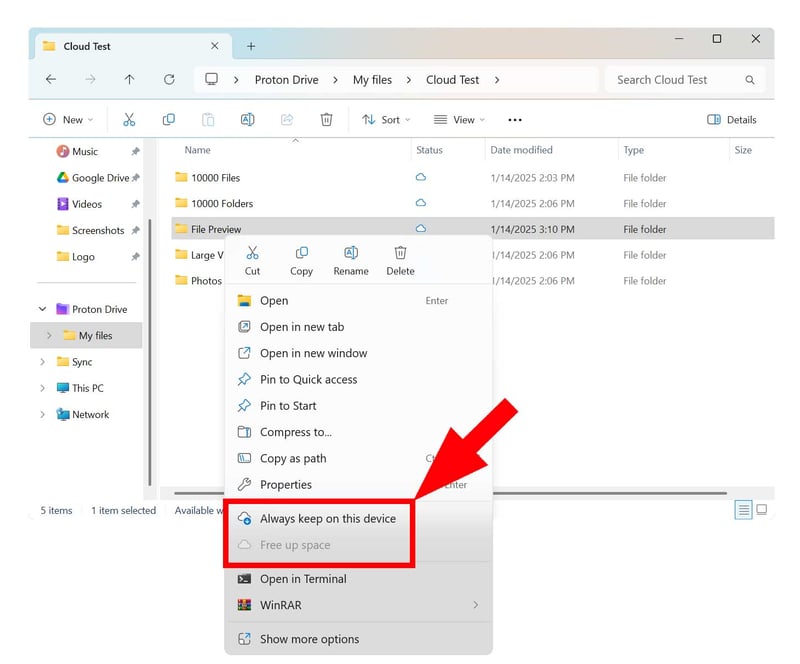
You can make files available offline with just a few clicks.
Limited Sync Settings and Features
Besides online and offline modes, Proton Drive offers very few customization options. For example, it doesn't support selective sync, which would let you choose specific subfolders to sync in Proton Drive. Instead, all files in the main folder are always synced.
Another missing feature is a backup option for local folders. While you can sync them using the "My Computer" option, this is a standard two-way sync that's not suitable for backups. If you delete files from the cloud, they'll also be removed from your device.
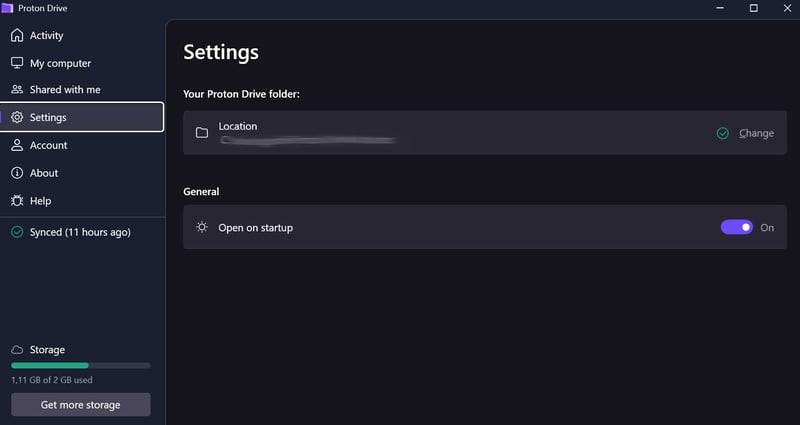
The desktop app settings are quite basic.
Mobile App: File Downloads and Photo Sync
On your smartphone, files are accessed online by default, but you can make files and folders available offline. This saves them on your device so you can use them without an internet connection.
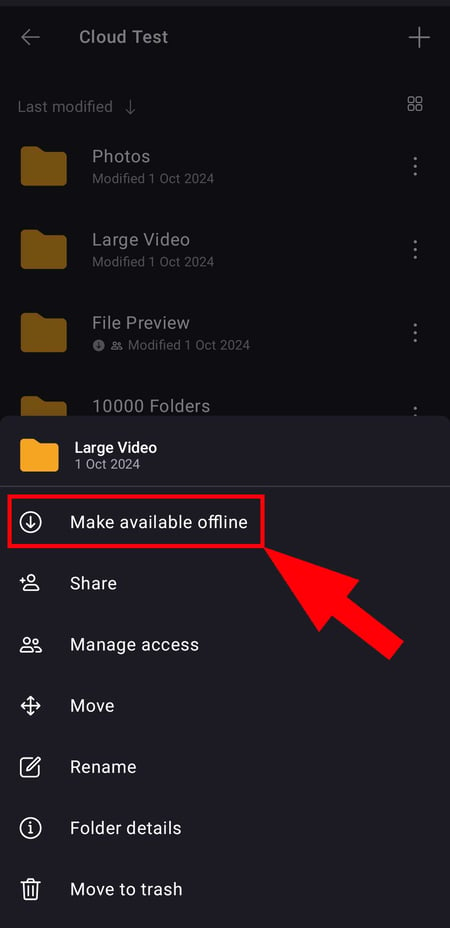
You can make individual files and entire folders available offline.
You can also "download" your cloud files to make them available on your device outside of the Proton Drive app.
Here's a comparison of Proton Drive's main sync features with other providers:
| Proton | Dropbox | pCloud | MEGA | Tresorit | Microsoft OneDrive | Icedrive | Sync.com | Google Drive | STRATO | IONOS | |
|---|---|---|---|---|---|---|---|---|---|---|---|
| Selective Sync | ✗ | ✓ | ✓ | ✓ | ✓ | ✗ | ✓ | ✓ | ✗ | ✓ | ✓ |
| Online Mode | ✓ | ✓ | ✓ | ✓ | ✓ | ✓ | ✓ | ✓ | ✓ | ✗ | ✗ |
| Back up System Folders | ✗ | ✓ | ✗ | ✓ | ✗ | ✓ | ✓ | ✗ | ✓ | ✗ | ✗ |
| LAN Sync | ✗ | ✓ | ✓ | ✗ | ✗ | ✗ | ✗ | ✗ | ✗ | ✗ | ✗ |
| Limit Speed | ✗ | ✓ | ✓ | ✓ | ✓ | ✓ | ✗ | ✗ | ✗ | ✗ | ✗ |
| Total | 1 | 5 | 4 | 4 | 3 | 3 | 3 | 2 | 2 | 1 | 1 |
How Is Proton Drive's Performance?
For a good user experience, syncing should be fast and run smoothly in the background. Three main factors play a key role:
Upload speeds
How fast can files be uploaded to the cloud?Download speeds
How quickly can files be downloaded from the cloud?CPU usage
How much does syncing impact system performance?
To ensure a fair comparison, we tested all providers under the same conditions. Each cloud storage had to sync the same test folder containing:
10,000 files
10,000 folders
100 photos (about 500 MB)
one large video (about 500 MB)
We ran the sync test using a 400 Mbps connection.
Here are the performance test results:
| Upload | Download | CPU Usage | |
|---|---|---|---|
| MEGA | 00:09:45 | 00:10:00 | 47 % |
| pCloud | 00:10:00 | 00:04:30 | 31 % |
| Microsoft OneDrive | 00:25:00 | 00:11:30 | 34 % |
| Google Drive | 00:27:30 | 00:18:45 | 43 % |
| Dropbox | 00:30:45 | 00:10:00 | 73 % |
| Tresorit | 00:37:00 | 00:13:00 | 31 % |
| Sync.com | 00:38:30 | 00:03:30 | 33 % |
| Icedrive | 00:41:15 | 00:11:45 | 81 % |
| IONOS | 01:17:30 | 00:39:00 | 22 % |
| STRATO | 01:27:30 | 00:41:00 | 23 % |
| Proton | 01:33:45 | 00:35:30 | 27 % |
Unfortunately, Proton Drive's sync speeds were much slower than its competitors. The upload speed was terrible and ranked last in our comparison – top performers MEGA and pCloud were nine times faster. Download speeds were average at best. While CPU usage was decent, this doesn't make up for the poor speeds.
If you need fast and smooth synchronization to work on your files across different devices, Proton Drive might not be your best choice right now.
Proton Drive supports basic sync features: You can manage your cloud files in a central folder across devices and sync specific local folders with the cloud. However, compared to other cloud storage services, it lacks advanced features and settings options - and the performance was disappointing in our review.
File Sharing and Collaboration
| Share files via link |
| 4/5 |
| Share folders with users | Sharing entire folders is possible, but the options are limited. Also, a shared storage for members of the same Proton package is missing. | 2.5/5 |
| Request files | No | 0/2 |
| Team features |
| 4/8 |
Collaboration isn't a priority for Proton Drive, which makes sense given their focus on user privacy - after all, shared cloud environments pose a bigger security risk. Still, you have some options to share and work on files together.
Sharing in Proton Drive: Files and Folders
You can share files and folders in your Proton Drive in two ways:
- 1.
Email sharing: If you want to share files with specific people, email sharing is your best option. However, recipients need to have or create a Proton account to open the files.
- 2.
Link sharing: You can also create a public link that lets anyone - with or without a Proton account - access the shared files. However, this option doesn't allow editing.
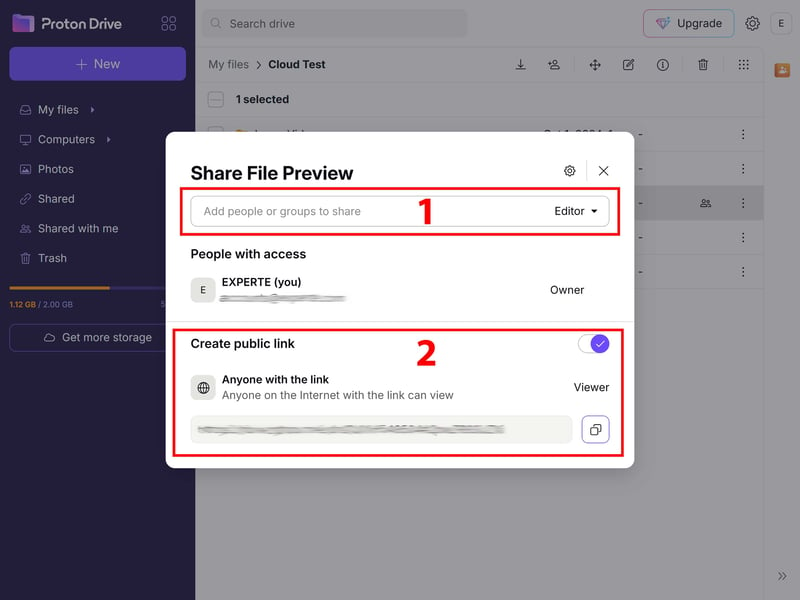
You can share files and folders through email or sharing links.
The settings options are basic. For links, you can set up a password and expiration date. With email sharing, you can choose between viewer and editor permissions. There's no detailed access control or team management dashboard. Also missing is a shared storage space for members of the same Proton package.
Another feature we wish it had is file requests. Many other cloud storage providers let you create a link to an upload portal where recipients (even without an account) can upload files to your cloud storage.
While you can share and manage files with others, Proton Drive isn't really designed for extensive teamwork.
Here's a comparison of Proton Drive's main sharing features:
| Proton | Tresorit | Sync.com | pCloud | STRATO | Microsoft OneDrive | MEGA | IONOS | Icedrive | Dropbox | Google Drive | |
|---|---|---|---|---|---|---|---|---|---|---|---|
| Share Files via Link | ✓ | ✓ | ✓ | ✓ | ✓ | ✓ | ✓ | ✓ | ✓ | ✓ | ✓ |
| Password Protected Links | ✓ | ✓ | ✓ | ✓ | ✓ | ✓ | ✓ | ✓ | ✓ | ✓ | ✗ |
| Expiration Date for Links | ✓ | ✓ | ✓ | ✓ | ✓ | ✓ | ✓ | ✓ | ✓ | ✓ | ✗ |
| Statistics for Links | ✗ | ✓ | ✓ | ✓ | ✗ | ✗ | ✗ | ✗ | ✗ | ✗ | ✗ |
| Share Folders With Users | ✓ | ✓ | ✓ | ✓ | ✓ | ✓ | ✓ | ✓ | ✓ | ✓ | ✓ |
| Request Files | ✗ | ✓ | ✓ | ✓ | ✓ | ✓ | ✓ | ✓ | ✓ | ✓ | ✓ |
| Total | 4 | 6 | 6 | 6 | 5 | 5 | 5 | 5 | 5 | 5 | 3 |
Real-Time Collaboration With Docs in Proton Drive
Proton Drive understands that users want simple and smooth cloud collaboration. At the same time, Proton wants to stick to its core promise: maximum data protection through end-to-end encryption.
The result is Docs in Proton Drive: a document editor built into the cloud storage that offers basic team features without compromising user privacy. All elements and actions in shared documents are end-to-end encrypted, so only authorized people can access the content.
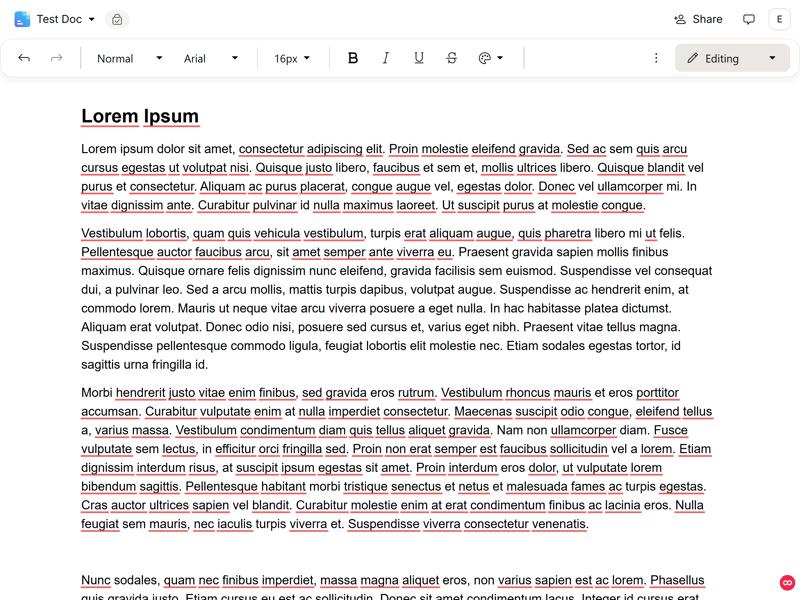
Docs in Proton Drive is an E2E-encrypted document editor.
The editor works like a simplified version of Word or Google Docs. You can edit text directly with all basic formatting options, or work in suggestion mode. You can also add tables, checklists, images, links, and code blocks.
It includes a comment feature too: you can highlight text and discuss with your team members in comments. When others are in the document, you can see their cursor movements in real-time and view changes instantly.
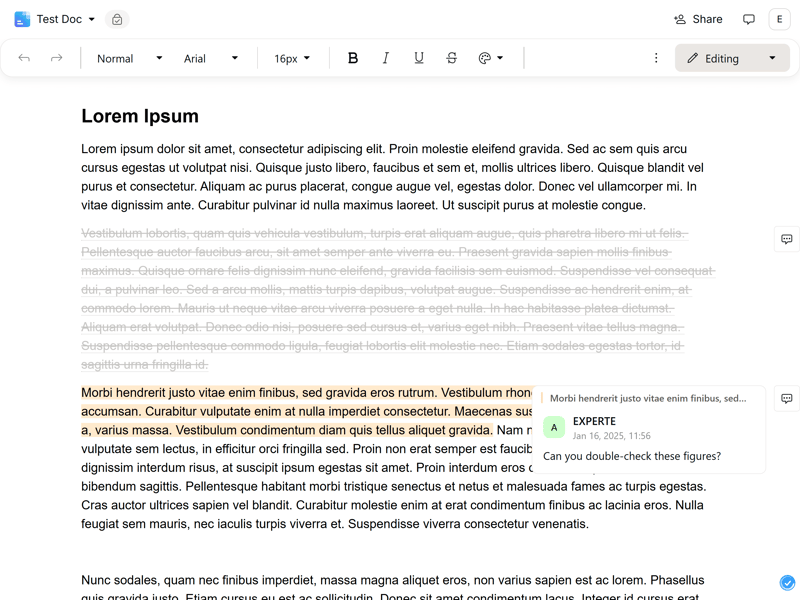
You can make suggestions and leave comments in the doc.
Proton's document editor is fast, intuitive, and works pretty well in practice. However, it doesn't make Proton Drive a real alternative to collaboration platforms like Google, Microsoft, or Dropbox because its features are too limited. For now, it only supports basic text documents - no presentations or (comprehensive) spreadsheets. Also, you can't convert just any text document into a Proton document.
Docs in Proton Drive is simply a privacy-focused alternative to Word or Google Docs - nothing more, nothing less.
Here's how Proton Drive's collaboration features compare to other providers:
| Icedrive | Microsoft OneDrive | Google Drive | Dropbox | Sync.com | Proton | Tresorit | STRATO | pCloud | MEGA | IONOS | |
|---|---|---|---|---|---|---|---|---|---|---|---|
| Team Management | ✗ | ✓ | ✓ | ✓ | ✓ | ✗ | ✓ | ✓ | ✓ | ✓ | ✓ |
| User Roles / Access Rights | ✗ | ✓ | ✓ | ✓ | ✓ | ✓ | ✓ | ✓ | ✓ | ✓ | ✓ |
| Comments | ✓ | ✓ | ✓ | ✓ | ✓ | ✓ | ✗ | ✗ | ✗ | ✗ | ✗ |
| Edit Documents | ✗ | ✓ | ✓ | ✓ | ✗ | ✓ | ✗ | ✗ | ✗ | ✗ | ✗ |
| Total | 1 | 4 | 4 | 4 | 3 | 3 | 2 | 2 | 2 | 2 | 2 |
Proton Drive supports basic sharing features and now even includes a document editor with E2E encryption. Still, the collaboration features are more of a nice extra and aren't as powerful, flexible, or smoothly integrated as other cloud storage services.
Security & Privacy
| End-to-end encryption | E2E encryption is enabled by default in all plans | 10/10 |
| Security assessment | Overall high security standards and full transparency thanks to open-source applications | 5/5 |
| File versioning | Yes, in all plans | 3/3 |
| Two-factor authentication | Yes | 2/2 |
| GDPR-compliant | Yes | 2/2 |
| ISO Certification | ISO 27001 | 1/2 |
| Transparency reports | Yes, but relatively limited | 1/2 |
| Jurisdiction | Switzerland | 2/2 |
While you'll have to accept some limits on features and performance, Proton makes no compromises on security and privacy: With end-to-end protection, modern security measures, and high transparency, Proton Drive is one of the safest cloud storage services available.
End-to-End Encryption by Default
All files you store in Proton Drive are protected by end-to-end encryption by default. You don't need to pay extra for this, and the E2E encryption isn't limited to specific folders.
Cloud storage without end-to-end encryption (E2E) does encrypt data, but this usually happens only on the provider's servers. That's why it's called server-side encryption. This means providers can technically access the data, making it vulnerable to privacy breaches.
With E2E encryption, data is encrypted directly on your device - the client side - before it's uploaded to the cloud. Even the provider has no way to decrypt or view the contents. Only you as a user (and authorized people you've shared your folders and files with) can access the contents of your cloud storage.
In practice, Proton Drive uses modern cryptographic methods like Elliptic Curve Cryptography (ECC Curve25519) and the OpenPGP standard. Files are encrypted on the client side before they reach Proton's servers. Each user has their own key pair: the public key encrypts the file, while the private key - which stays exclusively with the user - decrypts it.
Digital signatures are also used to detect any file tampering. Large files are split into 4MB blocks, which are encrypted and hashed separately to ensure their integrity.
You can find more details about Proton Drive's and Proton's security and encryption standards on the Proton Drive website and in their security whitepaper.
Transparency Through Open-Source Applications
Proton Drive follows a transparent security approach: All apps and encryption libraries are open source and available on GitHub. Independent experts have also reviewed Proton Drive, most recently by Securitum, a European security auditor. However, the last audit was in 2021, so it's been a few years.
Proton encourages users and other security experts to help find security gaps and issues. Through their bug bounty program, they can report vulnerabilities and earn rewards of up to $10,000.
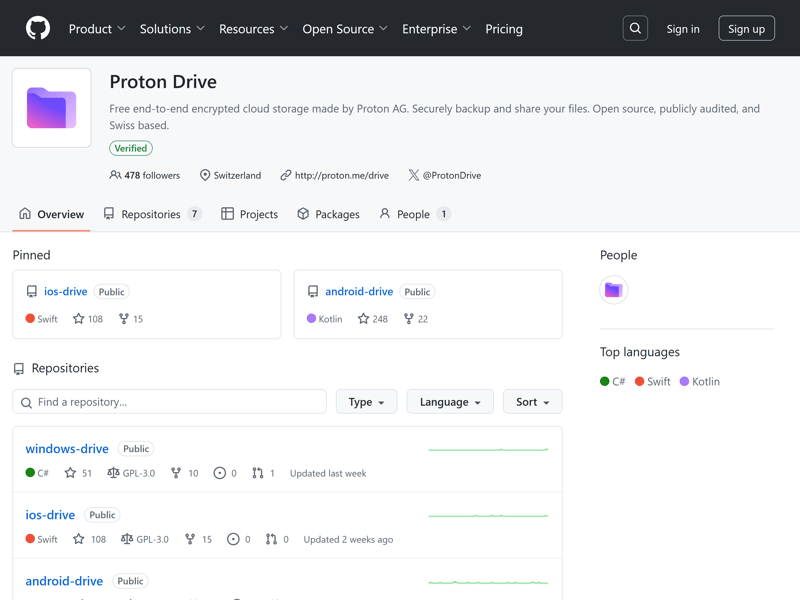
The source code of Proton Drive applications is open for anyone to see.
Proton is based in Switzerland. It's actually a real Swiss company - not just a company with a Swiss mailbox that operates from another country. This means Proton follows Swiss privacy laws, which are relatively strict. For example, data can't be easily shared with foreign authorities.
Proton regularly publishes reports about legal requests. While their transparency report is shorter than those of other providers, this is less important since Proton can't share any sensitive data anyway thanks to end-to-end encryption.
Since 2024, Proton has ISO 27001 certification.
Data Loss Protection: Version History
Proton Drive protects you from data loss with version history, letting you restore previous versions of your files when needed. This guards against accidental changes or data loss from malware.
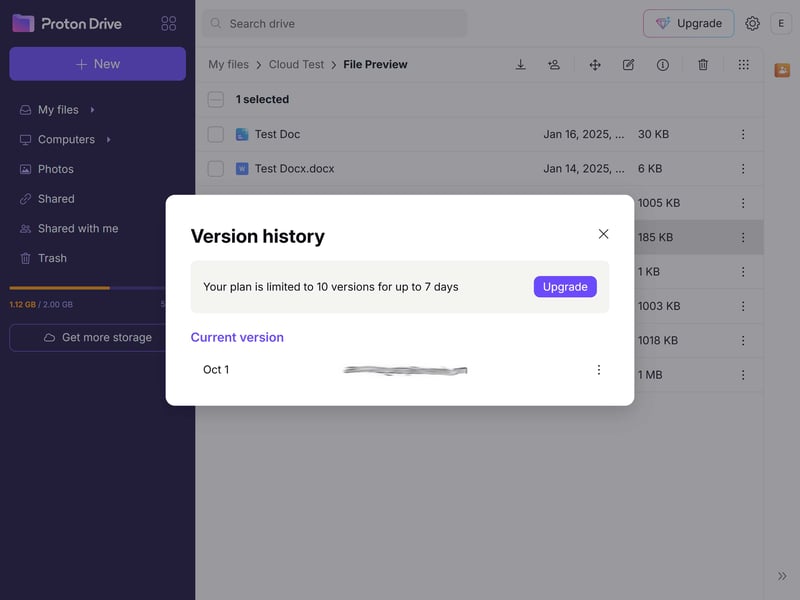
You can view and restore previous versions of any file.
The number of versions and storage time depend on your plan.
The free plan lets you keep up to ten versions of each file or versions up to seven days old - whichever comes first.
With paid plans, you can store up to 200 versions of each file for up to ten years - much longer than other cloud storage services.
Here's a comparison of Proton Drive's main privacy features:
| Proton | Tresorit | Dropbox | Microsoft OneDrive | MEGA | Google Drive | STRATO | pCloud | IONOS | Icedrive | Sync.com | |
|---|---|---|---|---|---|---|---|---|---|---|---|
| Security | |||||||||||
| End-To-End Encryption Possible | ✓ | ✓ | ✓ | ✗ | ✓ | ✗ | ✓ | ✓ | ✓ | ✓ | ✗ |
| E2E Encryption by Default | ✓ | ✓ | ✗ | ✗ | ✓ | ✗ | ✗ | ✗ | ✗ | ✗ | ✗ |
| Two Factor Authentication | ✓ | ✓ | ✓ | ✓ | ✓ | ✓ | ✓ | ✓ | ✓ | ✓ | ✓ |
| File Versioning | ✓ | ✓ | ✓ | ✓ | ✓ | ✓ | ✓ | ✓ | ✓ | ✓ | ✓ |
| Data Protection | |||||||||||
| GDPR Compliant | ✓ | ✓ | ✓ | ✓ | ✓ | ✓ | ✓ | ✓ | ✓ | ✓ | ✓ |
| ISO 27001 Certification | ✓ | ✓ | ✓ | ✓ | ✗ | ✓ | ✓ | ✓ | ✓ | ✗ | ✗ |
| ISO 27018 Certification | ✗ | ✓ | ✓ | ✓ | ✗ | ✓ | ✗ | ✗ | ✗ | ✗ | ✗ |
| Transparency Reports | ✓ | ✓ | ✓ | ✓ | ✓ | ✓ | ✗ | ✗ | ✗ | ✗ | ✗ |
| Jurisdiction | Switzerland | Switzerland | USA | USA | New Zealand | USA | Germany | Switzerland | Germany | UK | Canada |
| Total | 7 | 8 | 7 | 6 | 6 | 6 | 5 | 5 | 5 | 4 | 3 |
Proton Drive puts security and privacy first. It comes with built-in end-to-end encryption, open-source code for all apps, and Swiss privacy laws for legal protection. If you're worried about privacy with other cloud storage services, Proton Drive is a great choice.
Pricing
| Free (GB) | 5 GB | 4/8 |
| Price 100 GB | $3.99 | 1/2 |
| Price 500 GB | $9.99 | 1/2 |
| Price 2 TB | $23.99 | 0/2 |
| Price 5 TB | - | 0/2 |
| Price for 3 users | $23.99 | 0/2 |
| Price for 10 users | $83.89 | 1/2 |
Besides the free plan with 5 GB of storage, there are three paid plans for personal users: Drive Plus with 200 GB, Proton Unlimited with 500 GB, and Proton Duo for two users with a total of 1 TB storage space.
Starting with Proton Unlimited, you also get access to Proton Mail, Proton VPN, and Proton Pass. You can subscribe to all plans monthly or annually (with a discount).
There's also a family plan that offers 3 TB of storage for up to six people. Business plans are available too - both for Proton Drive alone or the complete Proton software suite.
Here's a current overview of Proton Drive's plans:
| Free | Plus | Unlimited | |
|---|---|---|---|
| Monthly Price | $0.00 | from $3.99 | from $9.99 |
| Contract Period (Months) | 0 | 1 - 12 | 1 - 12 |
| Limits | |||
| Storage Space | 5 GB | 200 GB | 500 GB |
| Number of Users | 1 | 1 | 1 |
| Number of Devices | 10 | 10 | 10 |
| Max. File Size | 5 GB | 200 GB | 500 GB |
| End-to-End Encryption | ✓ | ✓ | ✓ |
| File Versioning | 7 days | 3,650 days | 3,650 days |
Proton Drive Price Comparison
Proton Drive isn't among the cheaper cloud storage options on the market. While the starter plan with 200 GB is fairly affordable, you'll pay above-average prices if you need more storage space. However, this is partly because you get access to additional Proton products.
If you're already looking for a VPN or password manager, the Proton suite offers good value for money. But if you only need storage, the prices are quite high. Proton could better serve its users by offering standalone Proton Drive plans.
The free storage of 5 GB is average: Some providers offer more (MEGA and Google give you three to four times as much), while others offer less.
Here's our comparison table of monthly cloud storage costs:
| Free | Price 100 GB | Price 500 GB | Price 2 TB | Price 3 TB | Price 3 Users | Price 10 Users | |
|---|---|---|---|---|---|---|---|
| MEGA | 20 GB | $8.33 | $8.33 | $8.33 | $16.67 | $15.00 | $50.00 |
| Google Drive | 15 GB | $1.67 | $8.33 | $8.33 | $1.67 | $57.50 | |
| pCloud | 10 GB | $4.17 | $4.17 | $8.33 | $49.58 | $23.97 | $55.93 |
| Icedrive | 10 GB | $3.99 | $5.99 | $10.99 | $49.96 | ||
| Sync.com | 5 GB | $4.76 | $7.21 | $7.21 | $18.02 | $16.22 | $54.05 |
| Proton | 5 GB | $3.99 | $9.99 | $23.99 | $23.99 | $83.89 | |
| Microsoft OneDrive | 5 GB | $1.67 | $5.59 | $15.75 | $8.25 | $55.93 | |
| Tresorit | 3 GB | $9.99 | $9.99 | $48.00 | $48.00 | $160.00 | |
| Dropbox | 2 GB | $9.99 | $9.99 | $9.99 | $54.00 | $16.99 | $120.00 |
| STRATO | 0 GB | $2.75 | $2.75 | $9.58 | $47.92 | $11.98 | $22.00 |
| IONOS | 0 GB | $1.50 | $3.85 | $15.00 | $3.00 | $15.00 |
Proton Drive offers the best value when you use the complete Proton suite with email, VPN, and password manager. However, if you only need cloud storage, you'll pay more than average, especially considering Proton Drive has fewer features compared to other cloud storage services.
Review Results
Proton Drive shows you don't have to give up privacy and security in the cloud. Unlike cloud storage from well-known tech giants, all data you upload to Proton's cloud is end-to-end encrypted - meaning only you can see it.
This strong focus on security comes at a cost: Proton Drive syncs files noticeably slower than other cloud storage services and lacks many features that competitors offer as standard, such as advanced sharing and collaboration options.
Proton Drive isn't ideal for teamwork yet: While they now have their own document editor for real-time collaboration on text documents with team members, the options are limited compared to the extensive tools from Google, Microsoft, or Dropbox.
Proton Drive is best for users looking for a privacy-focused alternative to popular cloud storage services and are willing to accept slower performance and fewer features.

Proton Drive Reviews
What do Proton Drive users think about this cloud storage service? We looked at review sites and gathered common feedback for you. Compared to Proton in general and other Proton products, there aren't many user reviews for Proton Drive yet:
Strong end-to-end protection
Many users praise the end-to-end encryption that comes with all Proton Drive plans.Good value for Proton power users
Some reviews point out that the Proton Unlimited subscription offers good value since it includes Proton Drive, Proton Mail, Proton VPN, and Proton Pass.Focus on privacy
Long-time users appreciate Proton Drive's strong commitment to data protection and privacy. Many see it as a trustworthy alternative to big providers like Google.
Missing features and lack of flexibility
Some users criticize missing features and limitations, like the 100 MB limit for video playback. Users also want a Linux client.Disappointing performance
We're not alone in this: Many users complain about slow upload and download speeds.Poor support
While some users praise customer service, others report bad experiences when dealing with technical issues or trying to cancel subscriptions.
Alternatives to Proton Drive
Not sure if Proton Drive is the right cloud storage for you? Check out these alternatives:
Better collaboration features
Need cloud storage that's better for real-time collaboration? Try Google Drive, Microsoft OneDrive, or Dropbox. Just keep in mind that especially Google and Microsoft aren't great for privacy.
Here are the best alternatives to Proton Drive:

















